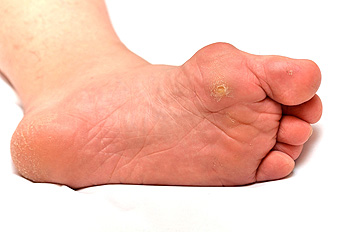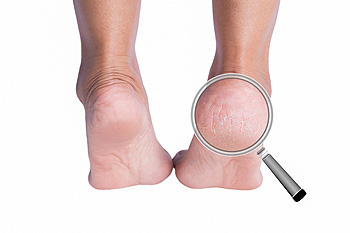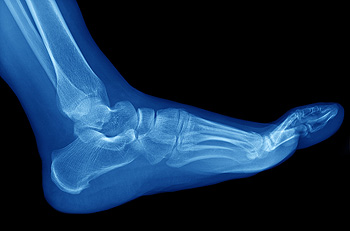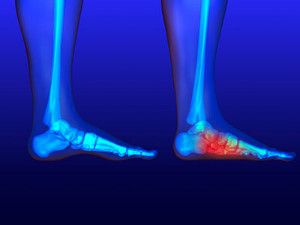Items filtered by date: July 2020
Wounds That Don't Heal Need to Be Checked
Wounds That Don't Heal Need to Be Checked
Treatment and Prevention for Corns
 Corns may develop as a natural protective measure against the pressure and friction endured by your feet. Over time, corns can become uncomfortable as the skin thickens, cracks, or becomes tender. If you have corns on your feet it is recommended to avoid taking long walks or standing for prolonged periods of time, as this could further aggravate the skin. To prevent corns, you may try wearing cushioned socks, wearing comfortable well-fitting shoes, using heel pads or insoles, regularly moisturizing your feet, and avoid walking barefoot. Seeing a podiatrist for your corns is also beneficial. A podiatrist can recommend appropriate footwear, remove callused skin, and prescribe additional treatments to reduce your pain and prevent corns from recurring in the future.
Corns may develop as a natural protective measure against the pressure and friction endured by your feet. Over time, corns can become uncomfortable as the skin thickens, cracks, or becomes tender. If you have corns on your feet it is recommended to avoid taking long walks or standing for prolonged periods of time, as this could further aggravate the skin. To prevent corns, you may try wearing cushioned socks, wearing comfortable well-fitting shoes, using heel pads or insoles, regularly moisturizing your feet, and avoid walking barefoot. Seeing a podiatrist for your corns is also beneficial. A podiatrist can recommend appropriate footwear, remove callused skin, and prescribe additional treatments to reduce your pain and prevent corns from recurring in the future.
Corns can make walking very painful and should be treated immediately. If you have questions regarding your feet and ankles, contact Harvey Jacobs, DPM of Quality Foot Care Center. Our doctor will treat your foot and ankle needs.
Corns: What Are They? And How Do You Get Rid of Them?
Corns are thickened areas on the skin that can become painful. They are caused by excessive pressure and friction on the skin. Corns press into the deeper layers of the skin and are usually round in shape.
Ways to Prevent Corns
There are many ways to get rid of painful corns such as:
- Wearing properly fitting shoes that have been measured by a professional
- Wearing shoes that are not sharply pointed or have high heels
- Wearing only shoes that offer support
Treating Corns
Although most corns slowly disappear when the friction or pressure stops, this isn’t always the case. Consult with your podiatrist to determine the best treatment option for your case of corns.
If you have any questions please feel free to contact our office located in Somerset, NJ . We offer the newest diagnostic and treatment technologies for all your foot and ankle needs.
Treatment and Prevention for Corns
 Corns may develop as a natural protective measure against the pressure and friction endured by your feet. Over time, corns can become uncomfortable as the skin thickens, cracks, or becomes tender. If you have corns on your feet it is recommended to avoid taking long walks or standing for prolonged periods of time, as this could further aggravate the skin. To prevent corns, you may try wearing cushioned socks, wearing comfortable well-fitting shoes, using heel pads or insoles, regularly moisturizing your feet, and avoid walking barefoot. Seeing a podiatrist for your corns is also beneficial. A podiatrist can recommend appropriate footwear, remove callused skin, and prescribe additional treatments to reduce your pain and prevent corns from recurring in the future.
Corns may develop as a natural protective measure against the pressure and friction endured by your feet. Over time, corns can become uncomfortable as the skin thickens, cracks, or becomes tender. If you have corns on your feet it is recommended to avoid taking long walks or standing for prolonged periods of time, as this could further aggravate the skin. To prevent corns, you may try wearing cushioned socks, wearing comfortable well-fitting shoes, using heel pads or insoles, regularly moisturizing your feet, and avoid walking barefoot. Seeing a podiatrist for your corns is also beneficial. A podiatrist can recommend appropriate footwear, remove callused skin, and prescribe additional treatments to reduce your pain and prevent corns from recurring in the future.
Corns can make walking very painful and should be treated immediately. If you have questions regarding your feet and ankles, contact one of our podiatrists of Quality Foot Care Center. Our doctors will treat your foot and ankle needs.
Corns: What Are They? And How Do You Get Rid of Them?
Corns are thickened areas on the skin that can become painful. They are caused by excessive pressure and friction on the skin. Corns press into the deeper layers of the skin and are usually round in shape.
Ways to Prevent Corns
There are many ways to get rid of painful corns such as:
- Wearing properly fitting shoes that have been measured by a professional
- Wearing shoes that are not sharply pointed or have high heels
- Wearing only shoes that offer support
Treating Corns
Although most corns slowly disappear when the friction or pressure stops, this isn’t always the case. Consult with your podiatrist to determine the best treatment option for your case of corns.
If you have any questions please feel free to contact our office located in Somerset, NJ. We offer the newest diagnostic and treatment technologies for all your foot and ankle needs.
Read more about Corns and CallusesWhat Are Flat Feet?
Flat feet is a condition when the arch, the curved part of the sole of your foot, touches the floor when you stand. Flat feet typically occur due to the foot not developing properly during childhood. However, feet may also become flat over time, as daily wear and tear of the foot causes the arch to weaken and fall. In some cases, people with flat feet exhibit no symptoms at all. In other cases, flat feet can cause issues ranging from mild discomfort to severe pain. Left untreated, pain could worsen and cause complications to the knees, hips, and spine. If you have flat feet and are experiencing pain or discomfort, consult with a podiatrist.
Flatfoot is a condition many people suffer from. If you have flat feet, contact Harvey Jacobs, DPM from Quality Foot Care Center. Our doctor will treat your foot and ankle needs.
What Are Flat Feet?
Flatfoot is a condition in which the arch of the foot is depressed and the sole of the foot is almost completely in contact with the ground. About 20-30% of the population generally has flat feet because their arches never formed during growth.
Conditions & Problems:
Having flat feet makes it difficult to run or walk because of the stress placed on the ankles.
Alignment – The general alignment of your legs can be disrupted, because the ankles move inward which can cause major discomfort.
Knees – If you have complications with your knees, flat feet can be a contributor to arthritis in that area.
Symptoms
- Pain around the heel or arch area
- Trouble standing on the tip toe
- Swelling around the inside of the ankle
- Flat look to one or both feet
- Having your shoes feel uneven when worn
Treatment
If you are experiencing pain and stress on the foot you may weaken the posterior tibial tendon, which runs around the inside of the ankle.
If you have any questions please feel free to contact our office located in Somerset, NJ . We offer the newest diagnostic and treatment technologies for all your foot and ankle needs.
What Are Flat Feet?
Flat feet is a condition when the arch, the curved part of the sole of your foot, touches the floor when you stand. Flat feet typically occur due to the foot not developing properly during childhood. However, feet may also become flat over time, as daily wear and tear of the foot causes the arch to weaken and fall. In some cases, people with flat feet exhibit no symptoms at all. In other cases, flat feet can cause issues ranging from mild discomfort to severe pain. Left untreated, pain could worsen and cause complications to the knees, hips, and spine. If you have flat feet and are experiencing pain or discomfort, consult with a podiatrist.
Flatfoot is a condition many people suffer from. If you have flat feet, contact one of our podiatrists from Quality Foot Care Center. Our doctors will treat your foot and ankle needs.
What Are Flat Feet?
Flatfoot is a condition in which the arch of the foot is depressed and the sole of the foot is almost completely in contact with the ground. About 20-30% of the population generally has flat feet because their arches never formed during growth.
Conditions & Problems:
Having flat feet makes it difficult to run or walk because of the stress placed on the ankles.
Alignment – The general alignment of your legs can be disrupted, because the ankles move inward which can cause major discomfort.
Knees – If you have complications with your knees, flat feet can be a contributor to arthritis in that area.
Symptoms
- Pain around the heel or arch area
- Trouble standing on the tip toe
- Swelling around the inside of the ankle
- Flat look to one or both feet
- Having your shoes feel uneven when worn
Treatment
If you are experiencing pain and stress on the foot you may weaken the posterior tibial tendon, which runs around the inside of the ankle.
If you have any questions please feel free to contact our office located in Somerset, NJ. We offer the newest diagnostic and treatment technologies for all your foot and ankle needs.
Read more about FlatfootHow do Cracked Heels Develop?
 Fissures, also known as deep cracks, can develop in the skin of the heel. They can cause pain and discomfort, and in severe cases, bleeding may occur. Cracked heels can develop as a result of dry skin, but can also be caused due to a variety of reasons. These can include standing on hard surfaces for the majority of the day, or from specific medical conditions such as psoriasis and eczema. Additionally, patients who are overweight may develop this condition as a result of the added weight the feet endure. Many patients find mild relief when the feet are soaked in warm water, followed by applying a good moisturizer. If you have cracked heels, it is suggested that you schedule an appointment with a podiatrist who can guide you toward proper maintenance advice and possible prevention techniques.
Fissures, also known as deep cracks, can develop in the skin of the heel. They can cause pain and discomfort, and in severe cases, bleeding may occur. Cracked heels can develop as a result of dry skin, but can also be caused due to a variety of reasons. These can include standing on hard surfaces for the majority of the day, or from specific medical conditions such as psoriasis and eczema. Additionally, patients who are overweight may develop this condition as a result of the added weight the feet endure. Many patients find mild relief when the feet are soaked in warm water, followed by applying a good moisturizer. If you have cracked heels, it is suggested that you schedule an appointment with a podiatrist who can guide you toward proper maintenance advice and possible prevention techniques.
Cracked heels are unsightly and can cause further damage to your shoes and feet. If you have any concerns, contact Harvey Jacobs, DPM from Quality Foot Care Center. Our doctor can provide the care you need to keep you pain-free and on your feet.
Cracked Heels
Cracked heels appear unappealing and can make it harder for you walk around in sandals. Aside from looking unpleasant, cracked heels can also tear stockings, socks, and wear out your shoes. There are several methods to help restore a cracked heel and prevent further damage.
How Do You Get Them?
Dry skin is the number one culprit in creating cracked heels. Many athletes, walkers, joggers, and even swimmers suffer from cracked heels. Age and skin oil production play a role to getting cracked heels as well.
Promote Healing
Over the counter medicines can help, especially for those that need instant relief or who suffer from chronic dry feet.
Wear Socks – Wearing socks with medicated creams helps lock in moisture.
Moisturizers – Applying both day and night will help alleviate dryness which causes cracking.
Pumice Stones – These exfoliate and remove dead skin, which allows for smoother moisturizer application and better absorption into the skin.
Change in Diet
Eating healthy with a well-balanced diet will give the skin a fresh and radiant look. Your body responds to the kinds of food you ingest. Omega-3 fatty acids and zinc supplements can also revitalize skin tissue.
Most importantly, seek professional help if unsure how to proceed in treating cracked heels. A podiatrist will help you with any questions or information needed.
If you have any questions, please feel free to contact our office located in Somerset, NJ . We offer the newest diagnostic and treatment technologies for all your foot care needs.
How do Cracked Heels Develop?
 Fissures, also known as deep cracks, can develop in the skin of the heel. They can cause pain and discomfort, and in severe cases, bleeding may occur. Cracked heels can develop as a result of dry skin, but can also be caused due to a variety of reasons. These can include standing on hard surfaces for the majority of the day, or from specific medical conditions such as psoriasis and eczema. Additionally, patients who are overweight may develop this condition as a result of the added weight the feet endure. Many patients find mild relief when the feet are soaked in warm water, followed by applying a good moisturizer. If you have cracked heels, it is suggested that you schedule an appointment with a podiatrist who can guide you toward proper maintenance advice and possible prevention techniques.
Fissures, also known as deep cracks, can develop in the skin of the heel. They can cause pain and discomfort, and in severe cases, bleeding may occur. Cracked heels can develop as a result of dry skin, but can also be caused due to a variety of reasons. These can include standing on hard surfaces for the majority of the day, or from specific medical conditions such as psoriasis and eczema. Additionally, patients who are overweight may develop this condition as a result of the added weight the feet endure. Many patients find mild relief when the feet are soaked in warm water, followed by applying a good moisturizer. If you have cracked heels, it is suggested that you schedule an appointment with a podiatrist who can guide you toward proper maintenance advice and possible prevention techniques.
Cracked heels are unsightly and can cause further damage to your shoes and feet. If you have any concerns, contact one of our podiatrists from Quality Foot Care Center. Our doctors can provide the care you need to keep you pain-free and on your feet.
Cracked Heels
Cracked heels appear unappealing and can make it harder for you walk around in sandals. Aside from looking unpleasant, cracked heels can also tear stockings, socks, and wear out your shoes. There are several methods to help restore a cracked heel and prevent further damage.
How Do You Get Them?
Dry skin is the number one culprit in creating cracked heels. Many athletes, walkers, joggers, and even swimmers suffer from cracked heels. Age and skin oil production play a role to getting cracked heels as well.
Promote Healing
Over the counter medicines can help, especially for those that need instant relief or who suffer from chronic dry feet.
Wear Socks – Wearing socks with medicated creams helps lock in moisture.
Moisturizers – Applying both day and night will help alleviate dryness which causes cracking.
Pumice Stones – These exfoliate and remove dead skin, which allows for smoother moisturizer application and better absorption into the skin.
Change in Diet
Eating healthy with a well-balanced diet will give the skin a fresh and radiant look. Your body responds to the kinds of food you ingest. Omega-3 fatty acids and zinc supplements can also revitalize skin tissue.
Most importantly, seek professional help if unsure how to proceed in treating cracked heels. A podiatrist will help you with any questions or information needed.
If you have any questions, please feel free to contact our office located in Somerset, NJ. We offer the newest diagnostic and treatment technologies for all your foot care needs.
Read more about Solutions for Cracked HeelsWhat Causes Arch Pain?
 Arch pain is most commonly caused when the ligaments in the arch of the foot become strained or weakened. Arch pain may also occur after extended periods of walking or standing, or due to some muscles in the arch working harder than others. An example of this would be when one does not walk in a straight line. Wearing shoes with improper arch support, overusing the feet during sports, and being overweight can also lead to stress and eventual pain in the arches of the feet. If you are experiencing pain in the arches of your feet, it is important to maintain a proper weight and wear proper footwear. If these issues persist, you may need to consult with a podiatrist to discuss what options could work to alleviate the pain.
Arch pain is most commonly caused when the ligaments in the arch of the foot become strained or weakened. Arch pain may also occur after extended periods of walking or standing, or due to some muscles in the arch working harder than others. An example of this would be when one does not walk in a straight line. Wearing shoes with improper arch support, overusing the feet during sports, and being overweight can also lead to stress and eventual pain in the arches of the feet. If you are experiencing pain in the arches of your feet, it is important to maintain a proper weight and wear proper footwear. If these issues persist, you may need to consult with a podiatrist to discuss what options could work to alleviate the pain.
Foot Pain
Foot pain can be extremely painful and debilitating. If you have a foot pain, consult with Harvey Jacobs, DPM from Quality Foot Care Center. Our doctor will assess your condition and provide you with quality foot and ankle treatment.
Causes
Foot pain is a very broad condition that could be caused by one or more ailments. The most common include:
- Bunions
- Hammertoes
- Plantar Fasciitis
- Bone Spurs
- Corns
- Tarsal Tunnel Syndrome
- Ingrown Toenails
- Arthritis (such as Gout, Rheumatoid, and Osteoarthritis)
- Flat Feet
- Injury (from stress fractures, broken toe, foot, ankle, Achilles tendon ruptures, and sprains)
- And more
Diagnosis
To figure out the cause of foot pain, podiatrists utilize several different methods. This can range from simple visual inspections and sensation tests to X-rays and MRI scans. Prior medical history, family medical history, and any recent physical traumatic events will all be taken into consideration for a proper diagnosis.
Treatment
Treatment depends upon the cause of the foot pain. Whether it is resting, staying off the foot, or having surgery; podiatrists have a number of treatment options available for foot pain.
If you have any questions, please feel free to contact our office located in Somerset, NJ . We offer the newest diagnostic and treatment technologies for all your foot care needs.
What Causes Arch Pain?
 Arch pain is most commonly caused when the ligaments in the arch of the foot become strained or weakened. Arch pain may also occur after extended periods of walking or standing, or due to some muscles in the arch working harder than others. An example of this would be when one does not walk in a straight line. Wearing shoes with improper arch support, overusing the feet during sports, and being overweight can also lead to stress and eventual pain in the arches of the feet. If you are experiencing pain in the arches of your feet, it is important to maintain a proper weight and wear proper footwear. If these issues persist, you may need to consult with a podiatrist to discuss what options could work to alleviate the pain.
Arch pain is most commonly caused when the ligaments in the arch of the foot become strained or weakened. Arch pain may also occur after extended periods of walking or standing, or due to some muscles in the arch working harder than others. An example of this would be when one does not walk in a straight line. Wearing shoes with improper arch support, overusing the feet during sports, and being overweight can also lead to stress and eventual pain in the arches of the feet. If you are experiencing pain in the arches of your feet, it is important to maintain a proper weight and wear proper footwear. If these issues persist, you may need to consult with a podiatrist to discuss what options could work to alleviate the pain.
Foot Pain
Foot pain can be extremely painful and debilitating. If you have a foot pain, consult with one of our podiatrists from Quality Foot Care Center. Our doctors will assess your condition and provide you with quality foot and ankle treatment.
Causes
Foot pain is a very broad condition that could be caused by one or more ailments. The most common include:
- Bunions
- Hammertoes
- Plantar Fasciitis
- Bone Spurs
- Corns
- Tarsal Tunnel Syndrome
- Ingrown Toenails
- Arthritis (such as Gout, Rheumatoid, and Osteoarthritis)
- Flat Feet
- Injury (from stress fractures, broken toe, foot, ankle, Achilles tendon ruptures, and sprains)
- And more
Diagnosis
To figure out the cause of foot pain, podiatrists utilize several different methods. This can range from simple visual inspections and sensation tests to X-rays and MRI scans. Prior medical history, family medical history, and any recent physical traumatic events will all be taken into consideration for a proper diagnosis.
Treatment
Treatment depends upon the cause of the foot pain. Whether it is resting, staying off the foot, or having surgery; podiatrists have a number of treatment options available for foot pain.
If you have any questions, please feel free to contact our office located in Somerset, NJ. We offer the newest diagnostic and treatment technologies for all your foot care needs.
Read more about Foot Pain

